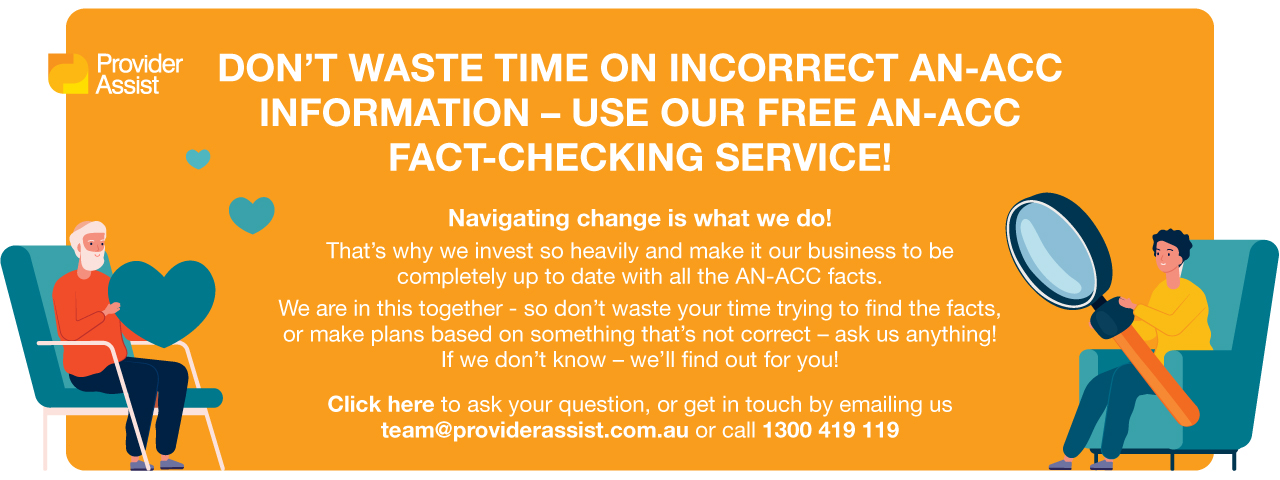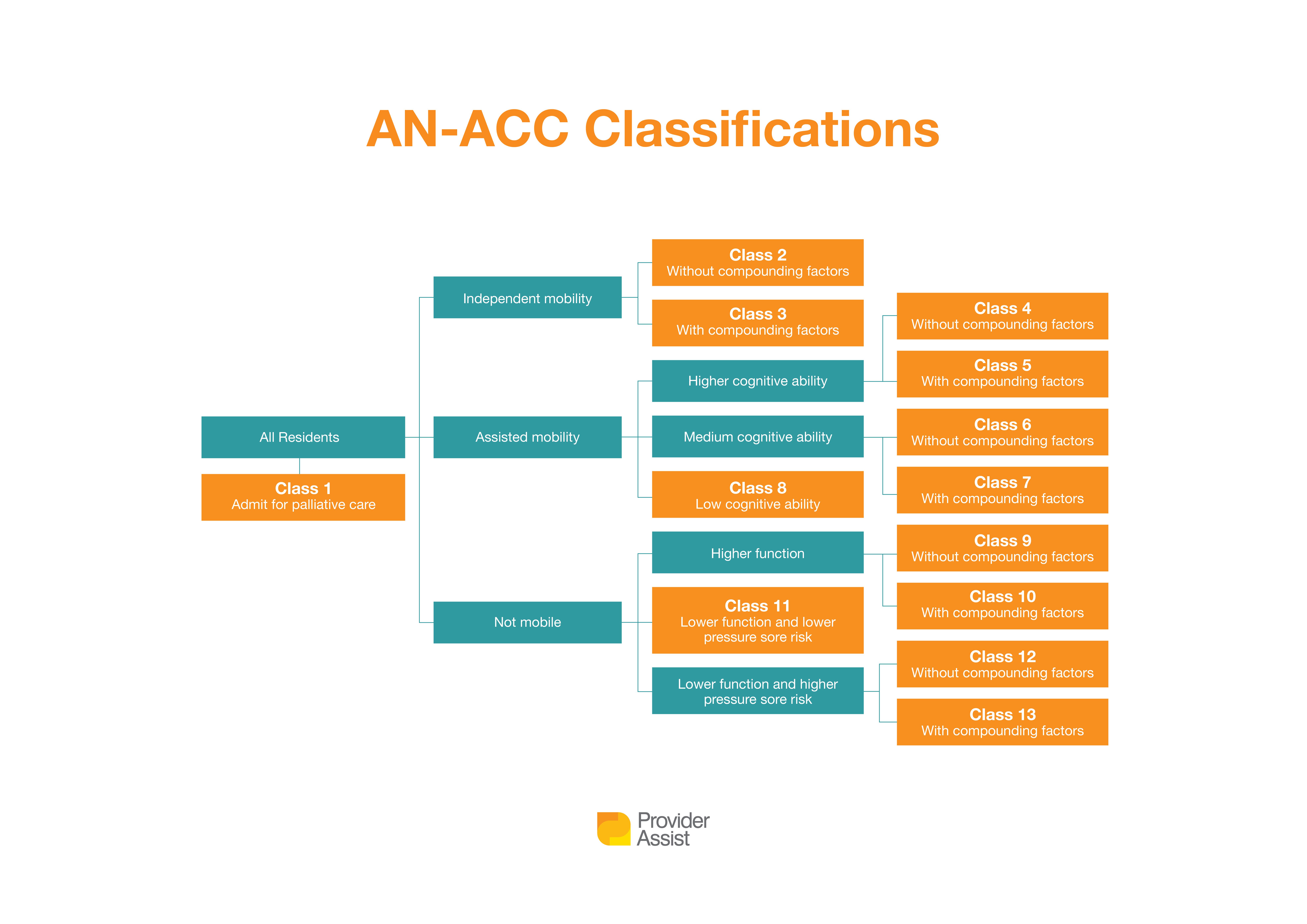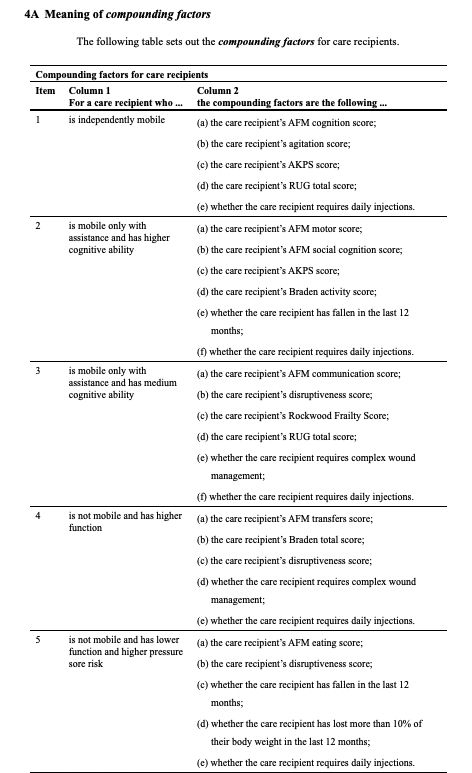Don’t waste time on incorrect Australian National Aged Care Classification – the AN-ACC – information – use our Free AN-ACC Fact-Checking Service!
Navigating change is what we do! In every change we’ve been through together as an industry we see 1 thing getting in the way of a successful transition every time and that is – incorrect information & rumours. Aaargh what a confusing time-waster!
That’s why we invest so heavily and make it our business to be completely up to date with all the Australian National Aged Care Classification (AN-ACC) funding model facts. We have resources dedicated to it. So don’t waste your time trying to find the facts or even making plans based on something that’s not correct – ask us anything! If we don’t know – we’ll find out for you! Email your question to team@providerassist.com.au
We are taking a very pragmatic approach to this transition and working closely with the department to validate anything we share. We believe it’s far too important and impactful to rely on rumours, assumptions and guesses. So any information we supply is directly from the Department:
- Information publicly available through their reforms page
- Information confirmed in our conversations with the Department
- Information we’ve received direct written confirmation on
So – here we’re compiling the answers to most frequent questions we’re getting about AN-ACC.
Looking for information on Care Minutes? We have a whole Care Minute FAQ article for all your questions relating to Care Minutes here: https://providerassist.com.au/news-resources/care-minutes-faq/
Fast Fact-Checker
Got a specific question you are dying to know more on? Here are the FAQs you can find in this article!
- What is the AN-ACC Funding Tool?
- What’s the latest update on the AN-ACC Funding Model?
- What information do we know that we can rely upon or reasonably rely upon?
- What about Stop-Loss and Grandparenting measures?
- When will Providers be told their Classifications?
- How are all the areas of clinical care funded under AN-ACC? i.e. 4bs
- What don’t we know yet?
- What exactly are the ‘Compounding Factors’?
- Does PA have an AN-ACC calculator?
- Isn’t the Government currently rolling out AN-ACC and replacing ACFI?
- So we don’t need to do ACFI anymore because it’s being replaced with AN-ACC?
- You say AN-ACC isn’t here yet, but someone is coming to my facility to do my funding assessments!
- What will it take to be successful when AN-ACC comes in?
- How do I prepare for AN-ACC?

What is the AN-ACC funding tool?
AN-ACC is the proposed new funding tool for Residential Aged Care. You can read about it here.
What’s the latest update on the AN-ACC funding model?
Currently the Government is undergoing the Shadow Assessment Period where, excluding Palliative Residents, all Residents will receive an AN-ACC classification by the 30th September 2022 (dependent on access to facilities).
The Bill that allows AN-ACC to be the new funding tool passed both Houses in Parliament in August 2022. The Bill to amend the Aged Care Act 1997 – Aged Care Amendment (Implementing Care Reform) Bill 2022 – is currently before the House of Representatives.
What we do know:
- The Classification received in the Shadow Assessment Period will determine the variable component of your Residents’ AN-ACC funding.
- All Australian Government funded Residential Aged Care Facilities will transfer to the AN-ACC funding model on 1 October 2022. ACFI will cease at this time.
- In the 2022-23 Budget Announcement, it stated Data from AN-ACC Shadow Assessments completed by independent assessors is now available through the My Aged Care Provider Portal as well as making some refinements to the Base Care Tariffs to increase funding and support to regional, rural and remote services.
- There will be an opportunity to request reassessments where a classification no longer represents a Resident’s care needs. Our thoughts on this area – this is great and we will help you do this. Don’t rely on this – there will be HUGE demand and you will be much better off getting it right from the beginning. You can request Reclassifications now via the My Aged Care Portal. To find out how, you can read our article here, and view several other articles we have on Reclassification on our News & Resources page
- Finally, the AN-ACC funding model starting price was released in the 2022-2023 Budget as $216.80 and includes:
- Current ACFI basic subsidy funding, including indexation on 1 July 2022.
- Homeless supplement and viability supplement, including indexation on 1 July 2022.
- The $3.2 billion $10 per resident per day 2021 Basic Daily Fee supplement.
- The $3.9 billion care minutes funding uplift, from 1 October 2022.
What information do we know that we can rely upon or reasonably rely upon?
- AN-ACC has an intended implementation date of October 2022
- The Royal Commission Final Report recommended that Aged Care funding should be delivered through a Casemix classification system – such as AN-ACC, or similar. AN-ACC is a Casemix Classification tool – all Residents will be allocated a classification of 1 to 13 which will determine the funding.
- AN-ACC is a 2 tier payment system, comprising of;
- A fixed payment per day for costs of care shared by Residents.
- A variable payment per day, for the cost of individual care needs for each Resident based on their AN-ACC Casemix class (will be determined by the Shadow Assessment Period; and
- An initial ‘one-off adjustment’ payment for each new Resident, to cover any costs with settling in a new Resident entering Residential Aged Care.
- The AN-ACC Assessment is based on:
- Resident interviews
- Observation (including of care activities)
- Clinical documentation
So it is very similar to the way ACFI validation currently occurs – see the Reference Manual & Assessment tool here: https://www.health.gov.au/resources/publications/AN-ACC-reference-manual-and-AN-ACC-assessment-tool
This means it will be critical to focus on the areas of:
- Assessment and documentation
- Team training and education
- Resident care understanding and acceptance
- A Transition Fund will be established and can be found referenced in the Residential aged care services and sustainability (Pillar 2 of the Royal Commission response) – Reforming residential care funding to drive better care and a viable system 2021-22 Budget Fact Sheet, which states that “A 2 year $53.3 million transition fund will also be established to assist providers who may need support during the transition.” Additionally, the 2022-23 Budget announcement saw a further $20.1 million investment into the Transition Fund, bringing the total to $73.4 million (as per the fact sheet here:
https://www.health.gov.au/sites/default/files/documents/2022/03/budget-2022-23-residential-aged-care-services-and-sustainability-improved-funding-for-residential-aged-care.pdf).The Government has released some information and a Fact Sheet on the Transition Fund. The Department of Health has determined the list of Providers that are eligible to apply for the AN-ACC Transition Fund and invited these eligible Providers to apply for the grant. Applications for the grant are now open via GrantConnect. - Funding is based on the National Weighted Activity Unit (NWAU)* and the price. The NWAU is essentially an expression of resource allocation. When we calculate AN-ACC Funding (excluding the new Resident adjustment), we take the NWAU related to the characteristics of the facility (based on specialisation and MMM score) and combine it with the NWAU related to the care needs of a Resident and multiply this value by the starting price.In the 2022-2023 Budget Announcement, the Australian Government released the AN-ACC Funding model starting price as $216.80 and includes:
- Current ACFI basic subsidy funding, including indexation on 1 July 2022.
- Homeless supplement and viability supplement, including indexation on 1 July 2022.
- The $3.2 billion $10 per resident per day 2021 Basic Daily Fee supplement.
- The $3.9 billion care minutes funding uplift, from 1 October 2022.
The Budget Announcement also released an estimate that the average Resident funding is expected to be approximately $225 per day.
*The NWAU is essentially an expression of resource allocation. Funding is based on the National Weighted Activity Unit (NWAU) and the price. When we calculate AN-ACC Funding (excluding the new Resident adjustment) we take the NWAU related to the characteristics of the Facility (based on specialisation and MMM score) and combine it with the NWAU related to the care needs of a Resident and multiply this value by the Starting Price. In the 2022-23 Budget, the Government released the ‘starting price’ of the AN-ACC funding model is $216.80. See the Budget Fact Sheet here: https://www.health.gov.au/sites/default/files/documents/2022/03/budget-2022-23-residential-aged-care-services-and-sustainability-improved-funding-for-residential-aged-care.pdf
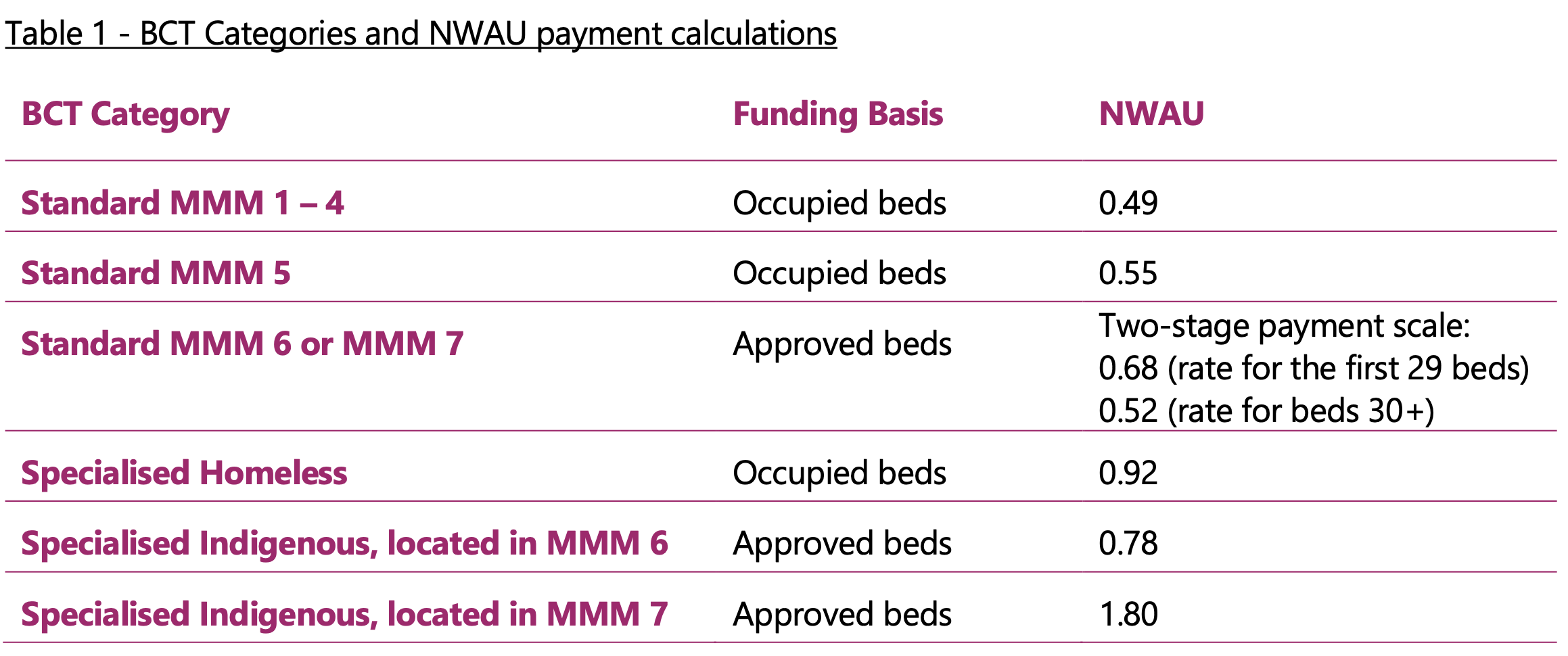
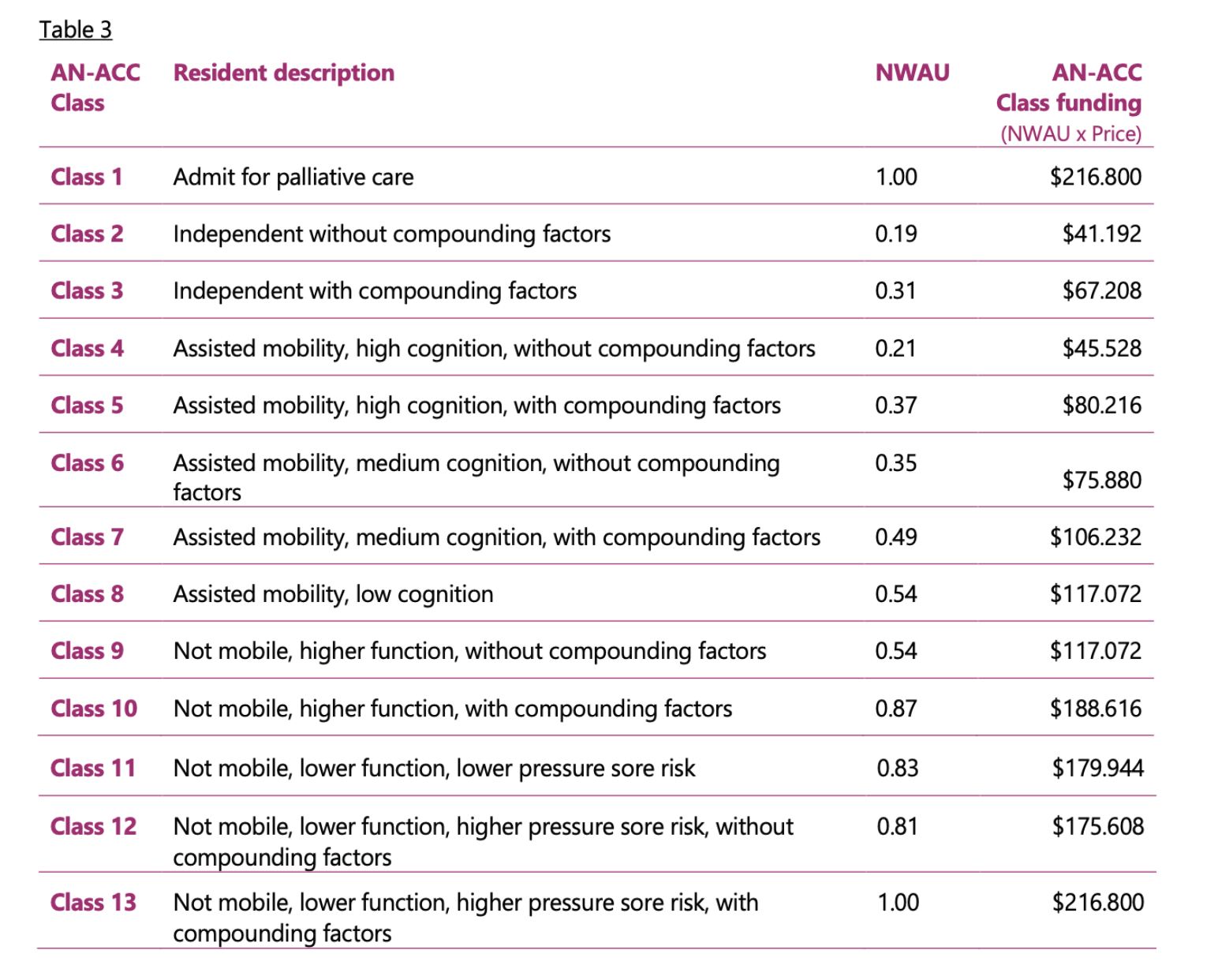
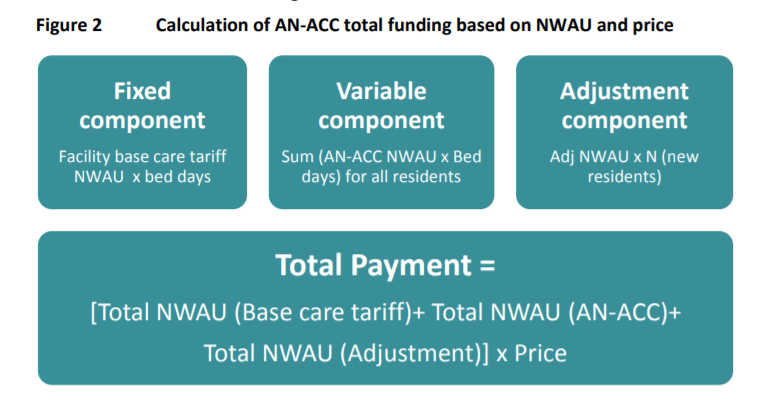

What about stop-loss & grandparenting measures?
The Resource Utilisation and Classification Study (RUCS) proposal for the AN-ACC funding model recommended as a part of the implementation strategy a proposed grandparenting measure, including Stop-Loss measures (see Report 6, Recommendations 21 & 22). The proposed grandparenting period would enable a gradual transition over 2-years with Stop-Loss measures that would ensure that funding would not drop more that 5% over the 2 years.
It was confirmed in a Department of Health Webinar on the Aged Care reforms that the proposed Stop-Loss Measures that were recommended in this proposal have not being approved. This decision was explained by Dr Nick Hartland (First Assistant Secretary for the In Home Aged Care Division) that as AN-ACC would be introduced at the same time at the $3.9B increase in care minutes, along with a Transition Fund, that a Stop-Loss mechanism would no longer be necessary.
However, as confirmed by LASA and the email communication sent to the sector on Budget night, but not included as a Budget measure, the Government has stated that it will ensure no Facility will receive less funding in the first 2 years of AN-ACC compared to their current funding. It appears that this will be as part of the Transition Fund with the Department to determine eligible Providers.
The Government has released some information and a Fact Sheet on the Transition Fund. The Department of Health has determined the list of Providers that are eligible to apply for the AN-ACC Transition Fund and invited these eligible Providers to apply for the grant. Applications for the grant are now open via GrantConnect.
In addition, the Government has confirmed that the AN-ACC classification given to each resident as part of the AN-ACC shadow assessment process will determine the variable funding component of AN-ACC funding from 1 October 2022. There will be an opportunity to request reassessments for Residents whose needs have changed between their assessment and the commencement of funding on 1 October 2022. All Australian Government funded residential aged care facilities will transfer to the AN-ACC funding model on 1 October 2022, with ACFI ceasing at this time.

When will Providers be told their classifications?
All Residents are currently being assessed and allocated into an AN-ACC classification via the Shadow Assessment. Data from AN-ACC Shadow Assessments completed by independent assessors is now available through the My Aged Care Provider Portal, where completed.

How are all the areas of clinical care funded under AN-ACC? i.e. 4bs
While ACFI dictates how you should spend the funding (i.e. 4bs), AN-ACC more says: This is how much it should cost to care for your Resident with these care needs and how you spend it is up to you, because you are governed by the Accreditation Standards as to what care to deliver.
Almost as if ACFI micro-manages how you spend your funding, while under AN-ACC how you should spend it is in line with clinical care and the standards.

What don’t we know?
- Although the Assessments the AN-ACC assessors are using are available, The Department are not planning to release, at this stage, how the AN-ACC Assessments link to the AN-ACC Classifications. Simply, the final AN-ACC will be available and no other information. See the Reference Manual & Assessment tool here: https://www.health.gov.au/resources/publications/AN-ACC-reference-manual-and-AN-ACC-assessment-tool

What exactly are the ‘Compounding Factors’?
The Classification Principles 2014, which were updated in July 2022, shares information on what is considered to be a Compounding Factor.
This can be found in the Classification Principles 2014 under Part 1—Preliminary section 4A Meaning of compounding factors.
Classification Principles 2014 under Part 1 — Preliminary section 4A Meaning of compounding factors https://www.legislation.gov.au/Details/F2022C00746
At this stage, we can be confident that Compounding Factors will likely be based on a consideration of outcomes from technical nursing requirements, findings from the Behaviour Resource Utilisation Assessment (BRUA) and parts of the Australian Functional Measure (AFM). However, components of other AN-ACC tools may also be considered. We don’t know just yet how these findings will be used to determine whether a Resident is considered to have Compounding Factors or not.

Does PA have an AN-ACC calculator?
Yes & no – we don’t have a generic AN-ACC calculator. The reason why? AN-ACC is a clinical tool and any meaningful analysis needs to be accompanied by a clinical analysis. Our currently available calculator is based on actual data provided by your Assessments that we can analyse for you. Reach out if this is something you are interested in.
At PA, we pride ourselves on helping Providers seamlessly navigate change and this step is too important to be generic.

Isn’t the Government currently rolling out AN-ACC and replacing ACFI?
Not quite yet! The Government have announced an intended implementation of AN-ACC on 1 October 2022.
What they are currently doing is continuing the research and evaluation of the tool by undergoing an AN-ACC Shadow Assessment period. There will be no change to the current ACFI funding system during the shadow assessment period. ACFI assessments, funding, and reviews will continue as normal for new and existing Residents. It’s the perfect time to get your ACFI house in order and ensure you’re receiving all of your entitlements now before you enter such an unknown phase.
You can read more about the shadow assessment period here and the Government’s own FAQs on the shadow assessment period here: https://www.health.gov.au/resources/publications/an-acc-shadow-assessment-period

So we don’t need to do ACFI anymore because it’s being replaced with AN-ACC?
No! In fact now is the time to make sure you get your ACFI house in order! Any new funding tool to be implemented takes a huge period of adjustment for Providers to get right, so it’s critical you are not missing out on the funding that is obtainable today. If there is funding you’re missing now – you won’t get back no matter how good at the transition you are. There will be no change to the current ACFI funding system during the shadow assessment period. ACFI assessments, funding, and reviews will continue as normal for new and existing Residents. See more information here: https://www.health.gov.au/health-topics/aged-care/aged-care-reforms-and-reviews/Residential-aged-care-funding-reform
- Stop Loss measures. It was previously confirmed in a Department of Health Webinar on the Aged Care Reforms that the proposed Stop-Loss Measures that were recommended in the Resource Utilisation Classification study have not being approved. This decision was explained by Dr Nick Hartland (First Assistant Secretary for the In Home Aged Care Division) that as AN-ACC would be introduced at the same time at the $3.9B increase in care minutes, along with a Transition Fund, that a Stop-Loss mechanism would no longer be necessary.However, as confirmed by LASA and the email communication sent to the sector on Budget night, but not included as a Budget measure, stated that it will ensure no facility will receive less funding in the first 2 years of AN-ACC compared to their current funding. It appears that this will be as part of the Transition Fund with the Department determining eligible Providers.

You say AN-ACC isn’t here yet, but someone is coming to my facility to do my funding assessments?
You may be contacted by one of the following organisations to visit your facility to conduct your AN-ACC Shadow Assessments. Their visit has no impact on your funding and you still need to complete your ACFI appraisals outside of this process.
- Access Care Network Australia Pty Ltd
- Australian Healthcare Associates Pty Ltd
- Care Tasmania Pty Ltd t/as Care Assess
- Health Administration Corporation, as represented by NSW Ministry of Health
- Healthcare Australia
- Serendipity (WA) Pty Ltd t/as Advanced Personnel Management.
Just be VERY CAREFUL when taking advice about the transition from the Assessors. We’ve already busted many myths our Clients have been told by Assessors. At this stage, we don’t believe they know more than the rest of us about the transition. And although well-intentioned, they may not be aware of how much damage they might do if facilities are to reply upon their opinions.
See more information here: https://www.health.gov.au/sites/default/files/documents/2021/02/AN-ACC—shadow-assessment-period.pdf

What will it take to be successful when AN-ACC comes in?
- Transparency – see exactly how you compare now and through the transition– you don’t want to wait months to notice your funding is less than it should be. MyVitals – Australia’s largest Residential Aged Care Benchmark, comparing nearly 140,000 beds is the perfect way to do this easily, quickly and at no cost. MyVitals helps you to work out where to start your Remarkable Preparation and we can help you devise a transition strategy.You can also join Provider Assist’s AN-ACC Benchmark – the largest in Australia. It is very simple to join, just follow our steps here!
- Claim ACFI entitlements you’re missing now to be in the best position: Funding you’re missing now you won’t get back no matter how good at the transition you are. Seems counter-intuitive to spend our days obsessing about the funding we’ll be missing in the future that you can do little about right now, while we’re currently missing out on funding that is obtainable today. Our ACFI services both achieve your missing ACFI funding and prepare you for AN-ACC – either the shadow assessment or reassessment at transition at no additional investment.
- Use the shadow assessment period to get you AN-ACC ready. The great news is: because our ACFI approach uniquely begins with deep comprehensive assessment, we are already preparing you for AN-ACC with no additional effort or expense from you…and very soon even more so –we’ve adapted our ACFI services to highlight & emphasise key clinical areas your AN-ACC Assessor is focusing on.
- Clinical assessment, documentation, Resident care acceptance, Carer Education – get it right, now. AN-ACC is not passive – it 100% relies on you getting your proactive systems for clinical assessment and care plans, including Holistic assessed needs-based clinical assessments completed by a clinician who is expert in this area and is able to clearly and succinctly paint the correct and complete picture. In addition to the clinical documentation which we can assist with – the Assessors will rely on interviews with and observation of Carers and Residents. Ensure the care being delivered is understood and accepted by both. To learn more about why this is important and how. Check out Marjory’s Story!

How do I prepare for AN-ACC?
Focus on what you can know and control now
- ACFI – claim what you’re missing now to be in the best position
- Clinical assessment, documentation, Resident Care Acceptance, Carer Education – get it right now.
- Stay on top of your data & performance, particularly relative to peers.
AN-ACC is not a set-and-forget tool
Providers have been learning through AN-ACC Reclassification, how much work is required to get their funding correct for the care they are delivering. AN-ACC is not a ‘set-and-forget’ autopilot tool where the AN-ACC Assessors take care of it all for you. It is really important to be one step ahead. We have created a guide and resources for approaching Reclassification, starting with this article here, or you can reach out to us to find out more team@providerassist.com.au or 1300 419 119.
Don’t get distracted by what you can’t know and control
There’s stuff we don’t know yet, but there’s plenty we do. Ambiguity is uncomfortable – This leads to a HUGE desire to do what ever you can, believe whatever is available in order to reduce that ambiguity. But work with us – when it comes to change we’re cool as a cucumber.
Be Prepared – but not distracted
You won’t see us making huge assumptions and spending ours and your time coming up with calculators and ACFI to AN-ACC Conversions because the details to make those helpful are not available yet – as soon as they are, we’re on it! So our advice is – use what we do know to leverage your transition.
Treat the Shadow Assessment as the real deal
The Government has confirmed that the AN-ACC classification given to each resident as part of the AN-ACC shadow assessment process will determine the variable funding component of AN-ACC funding from 1 October 2022. There will be an opportunity to request reassessments for residents whose needs have changed between their assessment and the commencement of funding on 1 October 2022. All Australian Government funded residential aged care facilities will transfer to the AN‑ACC funding model on 1 October 2022, with ACFI ceasing at this time. So our recommendation is – treat the Shadow Assessment visit as the real deal – ask how to prepare.
What we do know is as follows:
- Funding you’re missing now – you won’t get back no matter how good at the transition you are. Seems counter-intuitive to spend our days obsessing about the funding we’ll be missing in the future that you can do little about today, while we’re currently missing out on funding that is obtainable today. No matter how well you manage the transition to AN-ACC – the ACFI funding entitlements your missing now will be lost forever. Give yourself the best launching pad to enter the new AN-ACC world by claiming all your entitlements.
- AN-ACC is not passive – it 100% relies on you getting your proactive systems for clinical assessment and care plans, including Holistic assessed needs-based clinical assessments completed by a clinician who is expert in this area and is able to clearly and succinctly paint the correct and complete picture.
